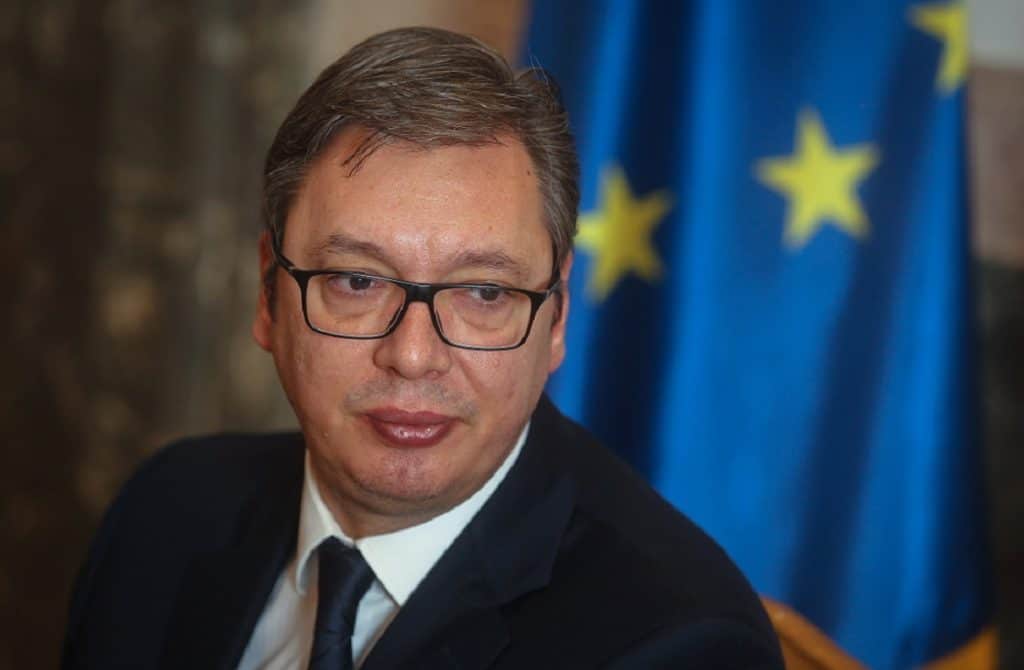By Nikola Mikovic
The European Union continues pushing Serbia to normalize ties with Kosovo. In order to speed up its accession negotiations with the EU—even though it remains highly uncertain if the southeastern European country will join the bloc any time soon, if at all—Belgrade will have to implicitly recognize a secession of its own territory.

On 18 March, Serbian President Aleksandar Vucic and Kosovo’s Prime Minister Albin Kurti, agreed to implement normalization steps at a meeting with EU officials in North Macedonia’s lake resort of Ohrid, although no document was signed. According to the EU foreign policy chief Josep Borrell, “the parties have fully committed to honor all articles of the agreement and implement their respective obligations expediently and in good faith.”
“The agreement is foreseen to become an integral and binding part of the respective European paths of the parties”, Borell stressed.
In other words, if Serbia and Kosovo aim to join the EU, they will have to fully implement the deal Vucic and Kurti have reached in Ohrid, as well as the European Union’s 11 point proposal on normalization of relations between Belgrade and Pristina. But what does practically mean?
According to the Article 4 of the EU’s proposal, Serbia will not object to Kosovo’s membership in any international organization. Belgrade has repeatedly emphasized that Kosovo’s membership in the United Nations is Serbia’s red line. However, the Ohrid deal states that “any failure to honor its obligations from the Agreement may have direct negative consequences for its respective EU accession processes and the financial aid it receives from the EU.” Thus, if Serbia continues preventing Kosovo from joining the UN, it may never join the EU, or get any financial aid from the bloc.
In reality, Kosovo may never join the UN, not because of Belgrade’s position, but because Russia and China – two permanent UN Security Council members – could always veto Pristina’s potential request, given that Moscow and Beijing see Kosovo as an integral part of Serbia. Quite aware of that, at this point the West is unlikely to insist on Kosovo’s UN membership. Instead, it likely expects Serbia not to oppose Kosovo’s potential membership in the Open Balkan Initiative.
Further, given that the deal Vucic and Kurti have reached in Ohrid represents Serbia’s implicit recognition of Kosovo’s 2008 unilaterally declared independence, the EU members that have still not recognized Kosovo (Spain, Greece, Romania, Slovakia and Cyprus) could soon change their current position. Once that happens, Brussels can formally grant Pristina the EU candidate status, and Kosovo can send a formal request to join NATO.
Meanwhile, according to the EU-brokered deals, Pristina will have to “immediately launch negotiations on establishing specific arrangements and guarantees to ensure an appropriate level of self-management for the Serbian community in Kosovo.” Kurti, however, insists that the constitution of the self-proclaimed Republic of Kosovo does not allow “any association based on ethnic criteria”, which is why he repeatedly refused to allow the local Serbs to form the Community of Serb Municipalities. But “launching negotiations” is not the same as granting the Serbs the right to have “an appropriate level of self-management”. Negotiations could last indefinitely. In other words, there is no guarantee that Pristina ever will give the Serbs any form of autonomy.
The EU, on the other hand, expects Serbia to violate its own constitution that explicitly states that Kosovo and Metohija is an integral part of Serbia. It is, therefore, not surprising that most Serbs oppose their country’s EU accession, while only 20 percent of the Serbian population have a positive opinion of the European Union. But given that Serbia is surrounded by NATO and EU members, and is economically heavily dependent on the EU, Vucic does not seem to have much choice but to find a way how to implement the EU-brokered deals and to save face.
However, even if Belgrade and Pristina normalize relations according to the EU proposal, it is highly unlikely that they will join the bloc in the foreseeable future. The European Union remains weary of further enlargement, and remains preoccupied with the war in Ukraine. As a result, receiving new members is not among its top priorities until 2024. Moreover, it has become clear that Serbia will not join the EU in 2025 either, despite progress in normalization of ties with Pristina.
Quite aware of that, Vucic did not sign any documents in Ohrid, although that does not mean that he will not implement the deals he has made with Kurti and the EU.
“In the months ahead, we are facing serious and difficult tasks”, the Serbian leader stressed.
Indeed, Vucic will have a hard time balancing the Western expectations that Belgrade must implicitly recognizes Kosovo, with the strong “no to capitulation” sentiment at home. Therefore, he could attempt to improve ties with the United States, hoping that he will get Washington’s tacit support not to go too far in an indirect recognition of Kosovo’s statehood.
Author: Nikola Mikovic (Journalist, researcher and analyst based in Serbia. He covers mostly the foreign policies of Russia, Belarus and Ukraine)
(The views expressed in this article belong only to the author and do not necessarily reflect the views of World Geostrategic Insights).







